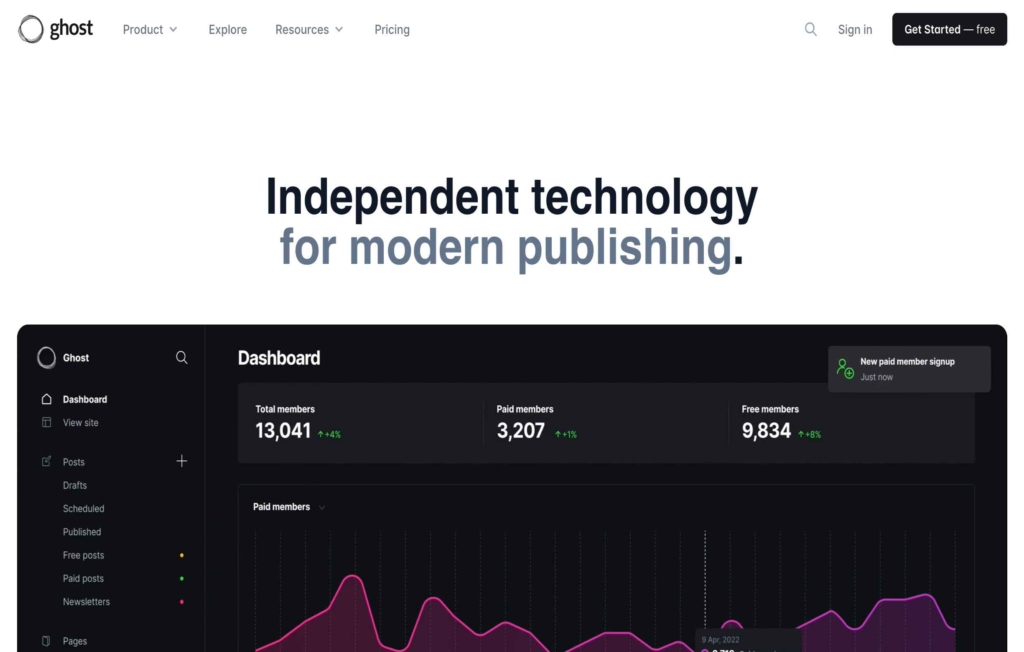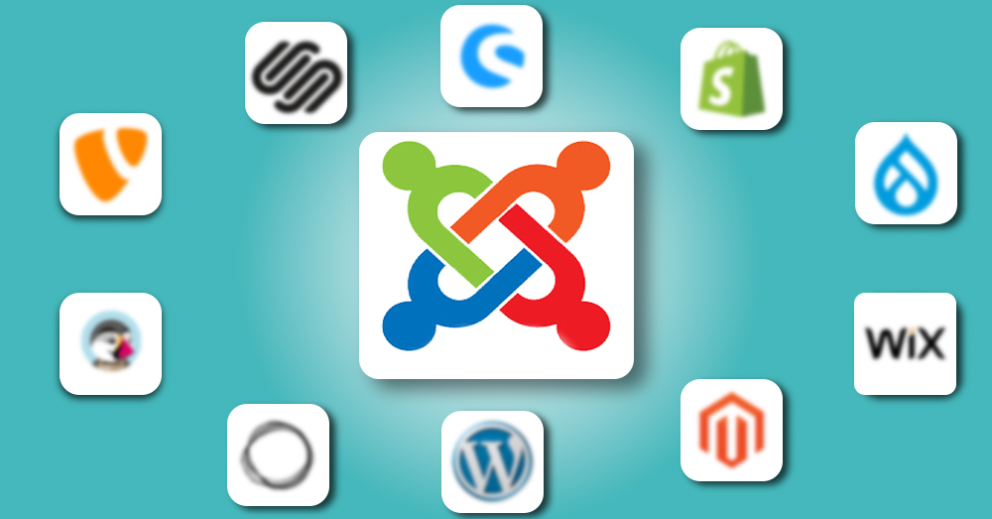Greetings! I'm Aneesh Sreedharan, CEO of 2Hats Logic Solutions. At 2Hats Logic Solutions, we are dedicated to providing technical expertise and resolving your concerns in the world of technology. Our blog page serves as a resource where we share insights and experiences, offering valuable perspectives on your queries.
Looking for Joomla alternatives in 2025? You’re not alone. Joomla has been a popular content management system (CMS) for years, but as web development evolves, it’s clear that better options are out there. While Joomla is still a solid choice for some, many businesses and developers are looking for more flexible and modern features.
Whether you’re not interested in Joomla or just curious about what else is available, exploring Joomla alternatives can open up more possibilities for your website. You don’t have to stick with a platform that no longer serves your needs when better and more user-friendly options exist.
This blog explores the 10 best Joomla alternatives that offer more freedom, better support, and tools to help your site advance in 2025.
Top 10 Joomla Alternatives for 2025
1. Shopware

Shopware 6 is an open-source eCommerce platform and the best Joomla alternative. This is suitable for businesses looking to scale their online stores with advanced features. While Joomla provides a flexible CMS for a variety of websites, Shopware 6 is strategically designed for eCommerce stores, offering customization options for building high-performance online stores.
If you are seeking expert help, partnering with a Shopware agency can greatly enhance the online store’s design, functionality, and overall performance. A Shopware SEO agency can also be crucial in implementing strategies that ensure your online store ranks higher in search engines, driving organic traffic and increasing conversions.
Shopware 6 offers extensive features such as multi-channel retail support, customer-centric shopping experiences, and easy third-party integrations. With its powerful Shopware plugin marketplace, businesses can enhance their stores with tools tailored to marketing, SEO, and automation. This makes it a strategic choice for companies aiming to optimize both their technical and marketing efforts.
2. WordPress

As the most popular CMS in the world, WordPress stands out as a powerful Joomla alternative. Its ease of use, combined with a massive ecosystem of plugins and themes, makes it highly customizable. Whether you’re running a blog or an eCommerce store, WordPress offers flexibility without the need for advanced coding skills.
WordPress excels in SEO, making it easier to rank your content on search engines. The platform’s frequent updates ensure security and reliability, supported by a vast community and extensive documentation. If you are looking for Joomla to WordPress migration, contact an expert e-commerce agency for a faster and smoother migration.
3. Drupal

Drupal offers a comprehensive solution for businesses that require a robust and complex content management system. Known for handling high-traffic sites and large volumes of content, it’s an ideal Joomla alternative for enterprises and government sites.
Though it has a hard learning curve, Drupal’s flexibility allows developers to create highly customized solutions with advanced features. It also excels in scalability and security, making it a top choice for industries with strict security requirements.
4. Shopify

Shopify is the perfect Joomla alternative for businesses focused on eCommerce. Its user-friendly platform allows anyone to set up an online store with ease. Shopify’s wide range of built-in tools for managing products, payments, and shipping simplifies the eCommerce process.
With integrated marketing tools like email campaigns, SEO optimization, and social media connectivity, Shopify is geared towards boosting sales. The platform is also highly scalable and capable of handling businesses from small startups to large enterprises.
5. Magento

Magento is a powerful Joomla alternative for businesses that need a customizable eCommerce solution. It’s highly favored by larger online retailers due to its flexibility in handling complex product catalogs and multiple stores.
Magento’s open-source version allows developers to build tailor-made solutions, while its enterprise version offers enterprise-grade features like advanced security, marketing automation, and analytics. If scalability and customization are priorities, Magento delivers an unmatched experience.
6. Wix

Wix offers a beginner-friendly alternative to Joomla, particularly for users who want to build visually stunning websites without any coding. Its drag-and-drop interface makes it easy to design websites, while its built-in templates offer plenty of options for customization.
Though more limited in functionality compared to some CMSs, Wix is ideal for small businesses, freelancers, and personal websites. It also provides SEO tools, hosting, and customer support, making it a one-stop shop for non-technical users.
7. Squarespace

Squarespace is another strong Joomla alternative, known for its sleek, professional design templates. It’s geared towards creatives, entrepreneurs, and small businesses looking for a polished online presence. The platform offers built-in hosting and strong integrations with marketing tools like email campaigns and social media management.
Squarespace also handles SEO and mobile optimization effortlessly, ensuring a seamless experience for both site creators and visitors. Its simplicity and design focus set it apart from more technical CMS platforms.
8. Typo3

Typo3 is a highly flexible Joomla alternative designed for enterprise-level websites. Known for its scalability and multilingual capabilities, it’s ideal for companies with a global presence.
Typo3 provides extensive features for content management, allowing large teams to collaborate efficiently. Its modular structure allows for high levels of customization, making it a preferred choice for complex websites requiring specific workflows and user permissions. While it requires more technical expertise, Typo3 offers a stable, feature-rich solution for large-scale projects.
9. Webflow

Webflow combines visual design tools with advanced CMS functionality, offering a dynamic Joomla alternative for designers and developers. It’s perfect for users who want to design custom websites without relying on templates or code-heavy systems. Webflow’s flexible editor allows for real-time design changes, and it integrates smoothly with various marketing and SEO tools. It’s a great choice for creatives, agencies, and businesses that want to build highly customizable and visually engaging websites.
10. Ghost

Ghost is an ideal Joomla alternative for bloggers and content publishers. Its minimalist design and focus on content creation allow writers to focus on producing quality content without the distractions of a bulky CMS. Ghost is built for speed and performance, with a modern, clean interface that emphasizes simplicity. It also offers powerful SEO features, making it a solid choice for those who prioritize content marketing. Ghost is lightweight yet highly effective for personal blogs and professional content sites.
11. PrestaShop

PrestaShop is a feature-rich Joomla alternative for eCommerce, especially for small to medium-sized businesses. It offers an open-source platform that’s highly customizable, allowing you to tailor your online store to specific business needs. PrestaShop supports a wide range of payment methods and shipping integrations, making it a versatile choice for online retailers. The platform also provides robust SEO tools and analytics, helping store owners optimize their sales funnel and increase conversions.
Why Migrate from Joomla?
Performance: Joomla can struggle with performance, especially for complex websites.
Security: Keeping Joomla up-to-date and secure can be challenging, especially for non-technical users.
Flexibility: Joomla’s structure may limit customization options for unique designs.
Maintenance: Managing extensions and updates can be time-consuming.
Cost: Ongoing maintenance and hosting costs can add up.
Choosing the Right Platform for Your Needs
When selecting an alternative to Joomla, it’s crucial to evaluate the specific needs of your website or business. The right platform can function your operations well, provide better user experiences, and scale with your growth. Take the time to align your goals with the features and offerings of each platform you consider. If you struggle to find the right solution, it’s always wise to seek expert help to make the best decision for your business.
Factors to Consider When Selecting Joomla Alternative
- Cost
Budget plays a vital part in deciding the right platform for a business. Some of the platforms may initial the payment with a lower amount but then charge a higher amount for extra services, while others can have more initial payments but may have a lower payment after that. Compare the pricing models, including hidden fees, maintenance costs, and scalability expenses.
- Ease of Use
Whether you’re a beginner or an experienced developer, the ease of use will impact your efficiency. They should have a user-friendly interface, working methods that would not confuse the user, and extensive tutorials. Intuitive design can bring enormous time benefits and minimize the frequency of appeals to technical assistance.
- Customization Capabilities
It may be that you have many special needs for your business and it is critical to create something unique and stand out from competitors. Some platforms are more flexible than others, even regarding designing unique features or connecting to other systems.
- Security
Security should be a top priority when choosing a platform, especially if you’re handling sensitive customer data. Make sure that the chosen forums and other communication platforms are regularly updated, have SSL, include firewalls, and can offer such advanced methods of encryption as, for example, SFTP. Also, guarantees that the platform meets data protection laws as much as it follows social media guidelines like GDPR compliance.
- Support and Community
Reliable support can be crucial in keeping your website running smoothly. Some platforms offer dedicated customer support, while others rely on community forums. Consider the availability of customer service, response times, and the presence of a vibrant community that can help troubleshoot issues or provide guidance on best practices.
Conclusion: Final Thoughts on Joomla Alternatives
The world of content management systems will continue to change, offering a range of powerful alternatives to Joomla. Whether you’re looking for more flexibility, better performance, enhanced security, or simply a platform that’s easier to use, the options available today cater to every need from small businesses to large enterprises. As CMS platforms continue to grow, the key is to understand your specific goals and select a solution that best aligns with your needs, budget, and technical capabilities. Take the time to assess your options and invest in a platform that will empower your online presence and support your long-term vision. If you find difficulty, it is always the best option to contact an expert to guide you through the process. Contact our e-commerce agency and let our team help you choose the ideal platform.
FAQ
Is it difficult to migrate from Joomla to WordPress?
Migrating from Joomla to WordPress is straightforward with the right tools. Plugins and migration services are available to streamline the process without losing important content or data.
What are the benefits of migrating from Joomla?
Migrating from Joomla can enhance website performance, improve security, offer more customization options, and simplify maintenance, making your website more scalable and user-friendly.

Related Articles







